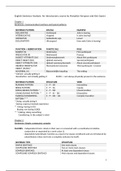Samenvatting
Language Optimization: Summary English Sentence Analysis, ISBN: 9789027225665
- Instelling
- Rijksuniversiteit Groningen (RuG)
A summary of the book English Sentence Analysis 'An Introductory Course'. Chapter 1 up to and including chapter 7 are summarized. Extra: with some Dutch translations of a few words and an extra overview of all concepts.
[Meer zien]





